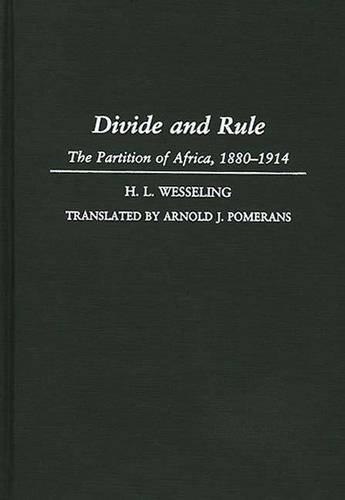
Divide and Rule: The Partition of Africa, 1880-1914
(Hardback)
Available Formats
Publishing Details
Divide and Rule: The Partition of Africa, 1880-1914
By (Author) H. L. Wesseling
Bloomsbury Publishing PLC
Praeger Publishers Inc
30th July 1996
United States
Classifications
Tertiary Education
Non Fiction
Historiography
Colonialism and imperialism
960.3
Physical Properties
Hardback
464
Width 156mm, Height 235mm
822g
Description
The partition of Africa was one of the most spectacular episodes in modern history. For Europeans, Africa was still an unknown continent in 1880. Thirty years later, almost all of it was under European control. This race for colonies went hand in hand with a host of thrilling exploits and dramatic conflicts, of which Stanley's exploration of the Congo and Gordon's death in Khartoum were just two examples. In "Divide and Rule", Wesseling dwells primarily on the historical developments. The many picturesque and problematic events are brought back to life. The leading characters are presented with gusto: the pioneers, the conquerors, the European politicians who tried to run the show no less, and the main African protagonists. For this reason, "Divide and Rule" is above all a story of one of the most dramatic highlights of the centuries-long history of European expansion.
Reviews
"This book is the most judicious and most evenhanded synthesis of the rich historiography concerning the partition of Africa from the perspective of European imperial historians. Its special merits are its overall clarity and its guidance to the relevant more specialized works so that it becomes an ideal textbook on the subject. Its brilliance lies in its weaving in of the diplomatic records about all the European players involved, rather than relying on an account derived from one or two major powers....It is this ability to refuse to simplify, to present complexity, to underline the interplay between the unexpected and the expected, which constitutes the main achievement of this remarkable work, and sets it off from others."-Jan Vansina, John D. Mac Arthur and Vilas professor emeritus University of Wisconsin-Madison
"The essence of Mr. Wesseling's analysis is that the partitioning of Africa was a sideshow that played itself out on the periphery of European geopolitics...Mr. Wesseling's analysis is probably closer to the truth than the more popular theories of a systematic and planned process of occupation...[he] paints for us a large canvas covered with intricate detail. It is a work of considerable scholarship..."-New York Times Book Review
Stylistically pleasant and based on a sound knowledge of the period, Wesseling's monograph demonstrates that the political makeup of present-day Africa was created by Europeans during the partition.... All levels.-Choice
The essence of Mr. Wesseling's analysis is that the partitioning of Africa was a sideshow that played itself out on the periphery of European geopolitics...Mr. Wesseling's analysis is probably closer to the truth than the more popular theories of a systematic and planned process of occupation...[he] paints for us a large canvas covered with intricate detail. It is a work of considerable scholarship...-New York Times Book Review
This most recent effort to synthesize the history of Africa's partition is a lively, accessible account for the interested layperson and for the serious scholar.-Publishers Weekly
Wesseling's style is light, his organization of confusing streams of events is masterful, and his decision to tell the tale through biographical sketches of the prime movers of events is attractive to the general reader.-International Journal of African Historical Studies
"Stylistically pleasant and based on a sound knowledge of the period, Wesseling's monograph demonstrates that the political makeup of present-day Africa was created by Europeans during the partition.... All levels."-Choice
"This most recent effort to synthesize the history of Africa's partition is a lively, accessible account for the interested layperson and for the serious scholar."-Publishers Weekly
"Wesseling's style is light, his organization of confusing streams of events is masterful, and his decision to tell the tale through biographical sketches of the prime movers of events is attractive to the general reader."-International Journal of African Historical Studies
Author Bio
H.L. WESSELING is Professor of General History in the University of Leiden, Holland, and Director of the Netherlands Institute for Advanced Study (NIAS).
